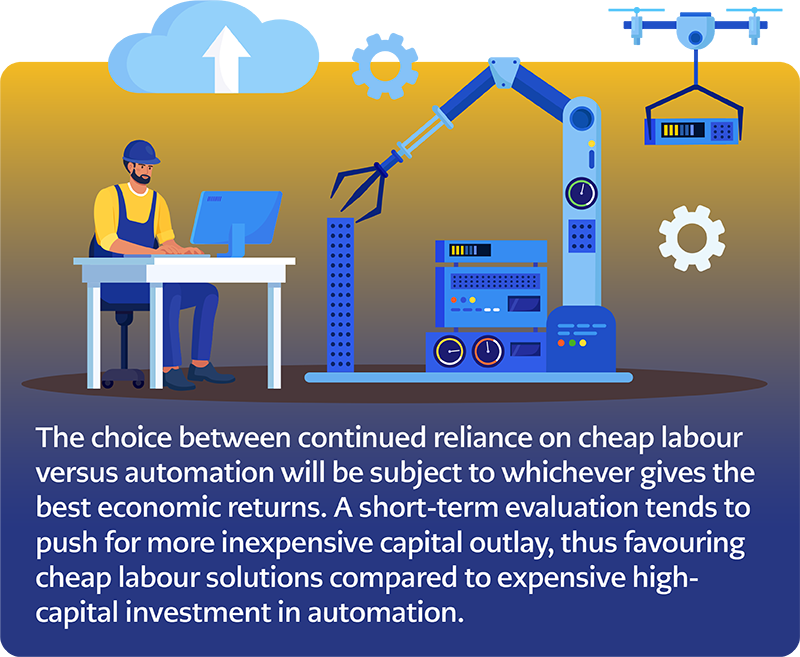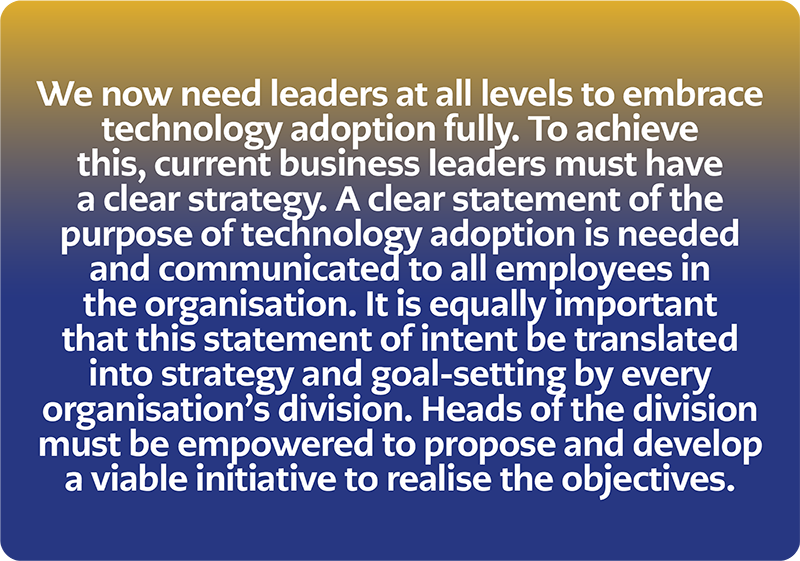Leadership for Technological Transformation
To achieve greater economic stability in this age, it is vital to look into digitisation and the sustainable aspect of digital adoption

The country's increasing demand for human resources has resulted in an influx of low-skilled foreign labour.
It has been said and accepted by many that Malaysia must now progress into a high-income nation. Since our independence, we have consciously shaped and developed our economy from one that depends on agriculture and minerals towards one that depends on the manufacturing-based industry. Today, with over one million enterprises and an economy of over 80% manufacturing-focused, we have certainly achieved our initial intent. Despite our good economic progress, we are stuck in an economic quagmire today.
Our initial success has created more than 98% of small and medium-sized industries and enterprises (SMI/SME), which mostly rely on low-skilled labour and manual processes. While this is sufficient for their immediate need to address local demand, it is neither efficient nor enables them to grow and compete in an increasingly globalised market. The country's increasing demand for human resources has aggravated the situation, leading to the importation of more low-skilled foreign labour.

Many bigger corporations opt for labour-intensive solutions instead of fully embracing digitisation and automation, contributing to falling behind the industry.
The scenarios for the medium and larger corporations are slightly different. These corporations have the financial capacity to tackle their requirement differently, and the options they are presented with will determine which ones they will pursue. Will they embrace digitalisation and automation over labour-intensive solutions? It must also be understood that not all large corporations are the same. While some do high-skilled technology-intensive work, many large corporations are here only to outsource mass manufacturing using low to semi-skilled cheap labour.
The continuous dependency on cheap, low, and semi-skilled labour over technology adoption by either the SMI/SME or more giant corporations has become an Achilles heel for Malaysia to progress into a high-income nation. This has kept Malaysia in the vicious cycle of a middle-income trap. It has enormous social and political implications. To get out of this dependency on low-skilled labour and adopt appropriate technology would require technology-aware leadership at all levels to assist in the transformation needed.

Aggressive technology adoption will not happen laissez-faire. Leaving the industry on its own to adopt technology will take a long time, especially when business priorities are based on short-term economic survival. The transition from the older generation leadership that is technology averse to younger leaders who are more technology savvy will only happen gradually. The inherent inertia to change cannot be overestimated. Worst still when the younger generations succumb to and accept the corporate culture of not embracing change. Instead of progressing with time, we end up with the newer generations maintaining the old culture.
As much as there are government incentives and support to promote technology adoptions in our industry, it will only happen with real industry leadership commitments towards this end. The industry cannot become over-dependent on government nudges alone. Thus, real change towards greater technology adoption can only become a reality if current industry leaders understand why we must embrace technology adoption and be committed towards this agenda.
While much is demanded from leaders of any industry today, the two most significant considerations are sustainability and digitalisation. Global market trends drive these two factors. The global economic community demands fair treatment and social welfare of workers. It also requires that economic activity would not lead towards environmental degradation. To ensure that social and environmental interests are protected, good governance systems and processes should be in place in all global enterprises. Ignoring all these will make any business not accepted in most developed markets and its supply chain, ensuring its eventual demise.

The primary challenge in transforming our economy into a high-income nation is not buying the latest technology hardware but adopting a changed mindset among our industry leaders.
The travel lockdown posed by the recent pandemic has also affected enterprises the world over to reassess the way we do business. The impact on the business supply chain and the ability to source either product components or services had industry leaders scrambling for solutions. The pandemic has undoubtedly acted as an accelerator towards technology adoption, especially towards digitalisation.
The double whammy of globalisation and the pandemic has made it necessary for industry leaders the world over to adapt. Digitalisation has now become a necessity if any global businesses were to survive. The physical market has been replaced with virtual platforms, and product development is integrated into the business supply chain ecosystem. You either have it, or you are out of the game.
With all these changes happening, our local enterprises can no longer not change the way we do things. Dependency on low and semi-skilled labour will not help us to compete in the global arena. It will not help us in any way if we are not in the global supply chain digital ecosystem. Cheap, low-skilled labour is a red herring that keeps us focused on the wrong thing. The hard work of more than a million SMI/SMEs that we have today will not be able to survive far into the future if our only competitive advantage is cheap labour.
Communicating and empowering staff in all divisions and departments towards these common goals of embracing technology in all facets of the business to improve efficiency and comply with global trends is key towards a successful transformation.
The primary challenge in transforming our economy into a high-income nation is not about buying the latest technology hardware. Far from it, we must instead adopt a mindset change among our industry leaders. We need leaders who are cognizant of the changing economic landscape and can move and inspire the entire organisation to adapt to the current demands.

A committed leader towards technology adoption is crucial. This change can only happen from the industry leaders who understand the urgency of this change. Balancing short-term profitability against long-term strategy to survive the changing economic landscape is a daunting challenge every business leader must endure.
The government's role is to assist, not be the primary mover for technology adoption. No matter how much the government and its agencies wanted the change to happen, without the willingness and commitment from the industry leaders, it will not translate into real, lasting change. This constant syndication between government and businesses is necessary to move forward.

Ir. Dr Mohd Shahreen Madros has over 30 years of working experience in various capacities. He was a lecturer at Universiti Kebangsaan Malaysia (UKM), with over 20 years of experience in the Oil & Gas industry. He was also the appointed CEO of MATRADE from early 2017 until Feb 2019, during which he represented Malaysia in many international trade missions. Dr Shahreen is currently an independent advisor to industries, a board member of a publicly-listed company, a certified coach, and an Adjunct Professor at the Graduate School of Business, UKM.





